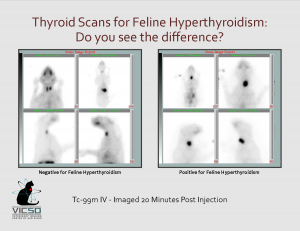An Introduction to Feline Hyperthyroidism
Your beloved pet is not just another patient to us — our doctors are committed to each and every single hyperthyroid case and have thorough knowledge of each of their patients. We strive to stay in constant contact with pet owners and their regular veterinarians before, during, and after treatment. This ongoing relationship helps to ensure proper case selection as well as a successful treatment and appropriate aftercare. Over the years we have become a nationally recognized leader in I-131 Therapy and have a 98% success rate.
We undoubtedly set the bar for I-131 treatment in San Diego, treating more of San Diego’s hyperthyroid cats than all other I-131 treatment facilities combined. This is because of our nationally recognized expertise in this area, our commitment to cats and their owners, and our core value that all cats should undergo a thorough pre-treatment screening process. Our experience in imaging and treating feline hyperthyroidism ensures that only those cats who require treatment and can safely undergo therapy are selected.
Our comprehensive I-131 Therapy package includes:
|
|
|
|
|
|
It is our firm belief that all cats should undergo extensive screening prior to hyperthyroid treatment. Although I-131 Therapy is painless and complications are very rare, poor case selection prior to treatment may result in a poor outcome.
Hyperthyroidism in cats often coincides with renal disease, and treating cats with hidden renal disease may unmask renal failure, therefore, we screen all hyperthyroid cats by requiring a Tapazole (Methimazole) trial prior to treatment in order to weed out those patients who are prone to developing renal disease after therapy. Additionally, we can perform a nuclear scintigraphy study to further evaluate renal function, if necessary.
All cats will receive a baseline echocardiogram (cardiac ultrasound) prior to treatment in order to exclude patients with severe heart disease since it is commonly associated with hyperthyroidism. This will also enable us to monitor the cat’s heart after therapy. We firmly believe in early therapy for heart disease that does not improve after feline radioiodine therapy is complete.
There are a small number of cases of feline hyperthyroidism that will not respond to I-131 Therapy as a result of an aggressive tumor (carcinoma) of the thyroid gland, which is why a pre-treatment thyroid scan is performed on all candidates to screen out such cases. The image below links to a sample comparison of thyroid scan images between a cat who was positive for feline hyperthyroidism and another who was negative. Can you immediately tell the differences in images?
As you can see, pre-treatment imaging is essential to selecting only those cases that will benefit from feline radioiodine therapy.
Throughout the duration of your cat’s stay with us, the treating veterinarian and licensed technicians will monitor him or her closely several times daily. Each day, bladder and bowel movements, the amount of food and water consumed, and the overall appearance and behavior of the cat are recorded. You will be given updates throughout the week by our technical staff, and they are available to speak with you should any questions or uneasiness arise. We understand that it is difficult to be away from your pet, and we want to make this as comfortable of an experience as possible for you and for them.
We welcome you to stop by during business hours to check on your cat and wave a hello through the large viewing window in our lobby. Furthermore, we have made it convenient for owners who are always on the go to view their cat via our I-131 Cat WebCam.
When your cat returns home they will slowly start to return to their pre-hyperthyroid state. If they lost weight as a result of being hyperthyroid, it may take a while for them to return to their original weight. We will work closely with your regular veterinarian and follow your cat’s status over the course of the next year. In order to monitor his or her progress, we do ask that bloodwork is checked by your regular veterinarian at 1, 3, 6, and 12 months following treatment.
We are not only concerned with the safety of your cat but your family as well, which is why you will be given specific instructions on caring for your cat once they have been discharged from our clinic.
Please do not hesitate to call our office if you have any questions regarding safety or your cat’s health. We are here to answer all of your questions and address any concerns that you may have.
You can read additional important information I-131 Cat Owner I131 tx info (Pearls) here.







